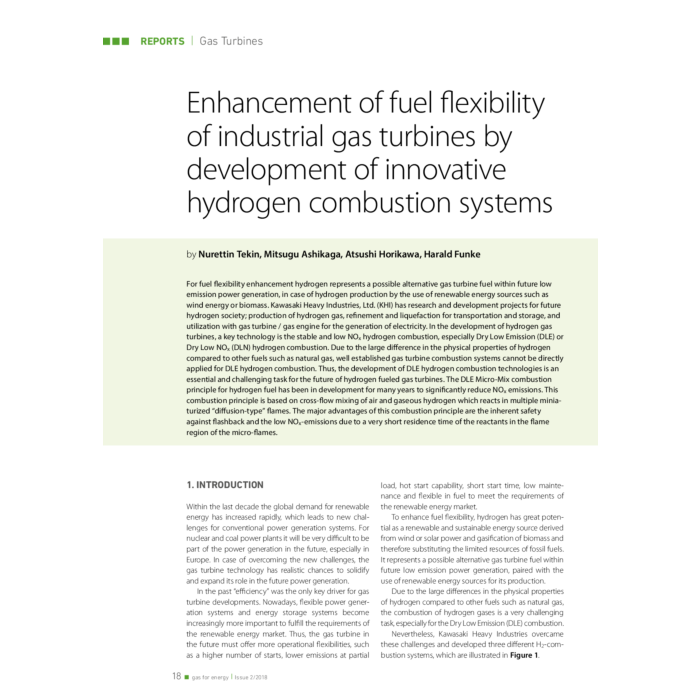Enhancement of fuel flexibility of industrial gas turbines by development of innovative hydrogen combustion systems
4,90 €
Auf Lager
Artikelnummer
00258_2018_02_01
For fuel flexibility enhancement hydrogen represents a possible alternative gas turbine fuel within future low emission power generation, in case of hydrogen production by the use of renewable energy sources such as wind energy or biomass. Kawasaki Heavy Industries, Ltd. (KHI) has research and development projects for future hydrogen society; production of hydrogen gas, refinement and liquefaction for transportation and storage, and utilization with gas turbine / gas engine for the generation of electricity. In the development of hydrogen gas turbines, a key technology is the stable and low NOx hydrogen combustion, especially Dry Low Emission (DLE) or Dry Low NOx (DLN) hydrogen combustion. Due to the large difference in the physical properties of hydrogen compared to other fuels such as natural gas, well established gas turbine combustion systems cannot be directly applied for DLE hydrogen combustion. Thus, the development of DLE hydrogen combustion technologies is an essential and challenging task for the future of hydrogen fueled gas turbines. The DLE Micro-Mix combustion principle for hydrogen fuel has been in development for many years to significantly reduce NOx emissions. This combustion principle is based on cross-flow mixing of air and gaseous hydrogen which reacts in multiple miniaturized “diffusion-type” flames. The major advantages of this combustion principle are the inherent safety against flashback and the low NOx-emissions due to a very short residence time of the reactants in the flame region of the micro-flames.
| Autoren | Nurettin Tekin, Mitsugu Ashikaga, Atsushi Horikawa, Harald Funke |
|---|---|
| Erscheinungsdatum | 12.08.2018 |
| Format | |
| Zeitschrift | gas for energy |
| Verlag | DIV Deutscher Industrieverlag GmbH |
| Sprache | English |
| Seitenzahl | 4 |
| Titel | Enhancement of fuel flexibility of industrial gas turbines by development of innovative hydrogen combustion systems |
| Beschreibung | For fuel flexibility enhancement hydrogen represents a possible alternative gas turbine fuel within future low emission power generation, in case of hydrogen production by the use of renewable energy sources such as wind energy or biomass. Kawasaki Heavy Industries, Ltd. (KHI) has research and development projects for future hydrogen society; production of hydrogen gas, refinement and liquefaction for transportation and storage, and utilization with gas turbine / gas engine for the generation of electricity. In the development of hydrogen gas turbines, a key technology is the stable and low NOx hydrogen combustion, especially Dry Low Emission (DLE) or Dry Low NOx (DLN) hydrogen combustion. Due to the large difference in the physical properties of hydrogen compared to other fuels such as natural gas, well established gas turbine combustion systems cannot be directly applied for DLE hydrogen combustion. Thus, the development of DLE hydrogen combustion technologies is an essential and challenging task for the future of hydrogen fueled gas turbines. The DLE Micro-Mix combustion principle for hydrogen fuel has been in development for many years to significantly reduce NOx emissions. This combustion principle is based on cross-flow mixing of air and gaseous hydrogen which reacts in multiple miniaturized “diffusion-type” flames. The major advantages of this combustion principle are the inherent safety against flashback and the low NOx-emissions due to a very short residence time of the reactants in the flame region of the micro-flames. |
Eigene Bewertung schreiben


